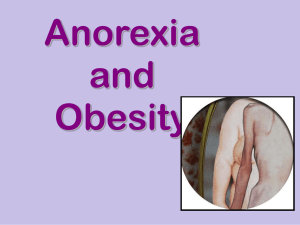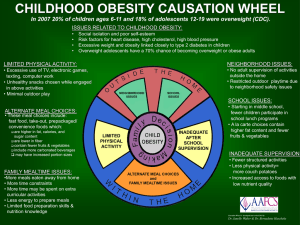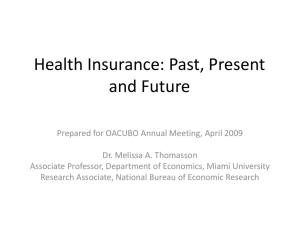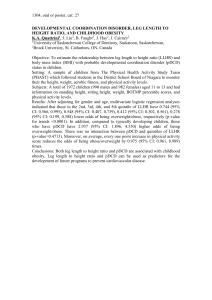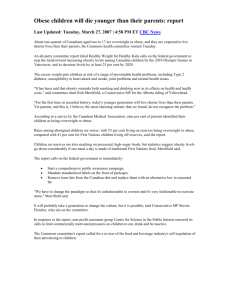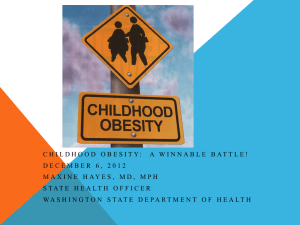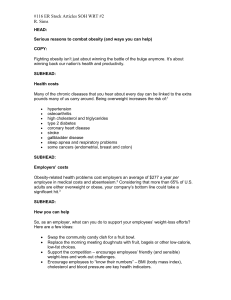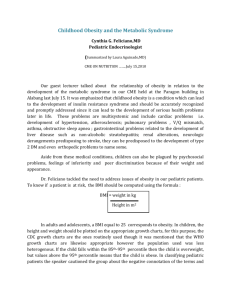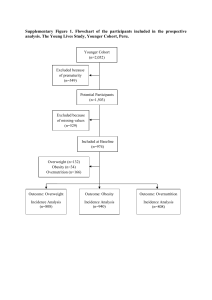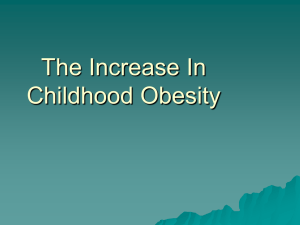Overweight and obesity among children
advertisement
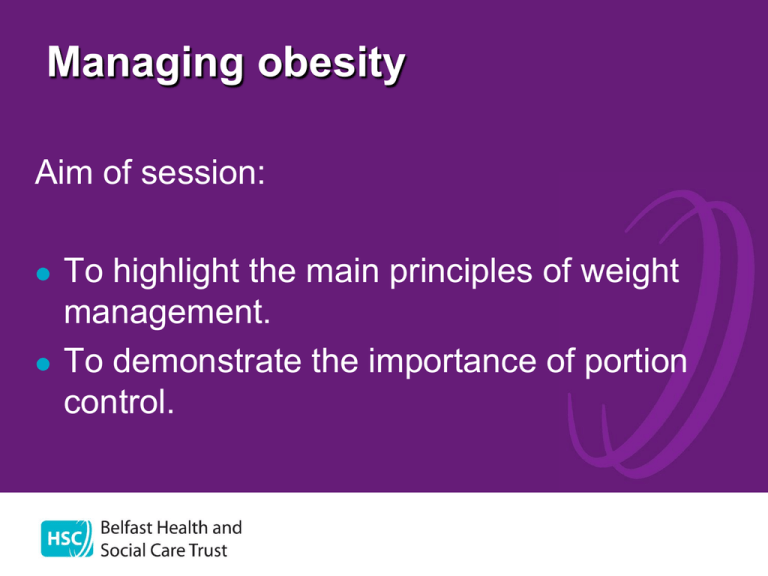
Managing obesity Aim of session: To highlight the main principles of weight management. To demonstrate the importance of portion control. Areas to be covered Definition of overweight and obesity in N.I How big is the problem in N.I? What is causing the problem? What can we do about it? The effect of portion sizes on calorie intake What’s the problem? Obesity =where weight has reached a level where it is detrimental to health. Obesity increases risk of chronic diseases especially type 2 diabetes, CHD, stroke, some cancers and arthritis. In children, obesity can lead to risk of CHD as adults Risk of bullying and teasing Negative self image Lack of confidence and low self esteem especially adolescents. Lower educational attainment Measuring obesity Usually measured as Body Mass Index (BMI) BMI= weight (Kg) height in m2 Adults Ready reckoner or chart helpful for this Healthy weight range 18.5-24.9 Overweight > =25- 29.9 Obese >=30-39.9 Very obese 40 and above Working out BMI Example: person weighing 80Kg who is 1.65m tall = BMI =29 kg/m2 =overweight 80kg / 2.72 (1.65m x1.65m) Adult weight in N.Ireland HSWB survey 2005/6 Rates of overweight in children in N.I. Almost 1 in 10 (8%) children aged 2-15 years is obese (NI Health and Social Wellbeing, 2006/07) Overweight and obesity in children was projected to rise but appears to have levelled off. 22% of children entering P1 were either overweight or obese (5% of these obese) (Child Health System, 2004/05) What’s causing the obesity problem? Human biology combined with modern living Societal influences Individual psychology Food Production Individual activity Activity Food Consumption environment Biology Obesogenic Environment Modern lifestyle-labour saving devices, TV viewing and computer games Lack of opportunities to be physically active Increased promotion and availability of snack foods and fast food. Increasing portion sizes to name but a few! What protects against obesity? Breastfeeding until at least 4 months Good weaning practices Maintaining healthy weight in pregnancy What if you are already overweight or obese? Evidence is for multi-component interventions dietary change Physical activity Behaviour change In children family based interventions are recommendedentire family involved. SIGN (2010) and NICE guidelines. Achieving a healthy weight Balancing energy in (food eaten) with Energy out Safe weight loss targets for overweight adults Aim for 1-2 lbs weight loss per week- energy intake by approx 500 Kcals per day to achieve weight loss of 0.5kg/ week (1lb) 5% weight loss Aim for weight maintenance as a minimum i.e. avoid weight gain. physical activity Eating well for weight loss Eat regular meals Eat a balanced diet Reduce portion sizes Reduce calorie intake Reduce fat – richest source of calories 1g fat=9Kcals 1g Carbohydrate=4 Kcals 1g Alcohol=7Kcals Reduce portion sizes Reduce proportion of foods from high fat and or sugar food group. Practical advice Choose healthy snacks Watch alcohol Read food labels Choose low calorie drinks Reduce sedentary time Focus on your food! Mindful eating. At least 5 fruit and veg a day Portions sizes Some product portion sizes have increased e.g. Passively eating more! Some products available in smaller portions but usually as multi packs Share packs available Signposting Leaflets and resources Small changes big benefits (public health agency) Eat well feel well and lose weight (Eastern area health promotion) Fit families (BCC) PROGRAMMES in Eastern area Weigh to health (for adults) FRESH (for 11-14 year olds) Useful web sites www.enjoyhealthyeating. org www.nhs.uk/Livewell/heal thyeating/Pages/Healthyeati ng.aspx www.weightconcern.org www.littlesteps.eu www.bdaweightwise.com www.change4life.org Preventing obesity is a societal challenge, similar to climate change. It requires partnership between government, science , business and civil society. Foresight report
